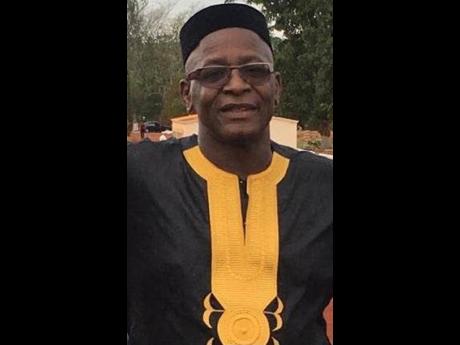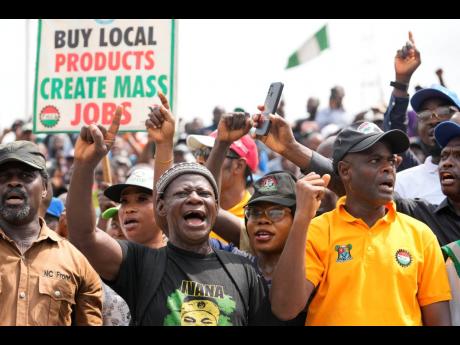Norris McDonald | West Africa and Michael Manley’s ‘Trade Union of the Poor’
“There will be no more exporting of gold to foreign countries,” Burkina Faso President, Captain Ibrahim Traore, told a shocked world in November 2023.
“The gold will be sold as finished product, and some of the gold will be used to back up Burkina Faso currency.”
President Ibrahim Traore heralds the dawn of a new Pan-African era in Africa that James Africanus Beale Horton, Henry Sylvester Williams, Marcus Garvey, Kwame Nkrumah, among others, worked and dreamt about.
My friends, it appears darkest when the rising sun is on the horizon, but there is no need to feel despondent.
The new political transformation in West Africa is a part of a fast-changing, new world, political, economic and historical process.
Burkina Faso, Niger and Maili have formed a new Pan-Africanist union with the aim of safeguarding their political economic independence; jointly fighting terrorism and working for mutual economic development.
WEST AFRICAN POWER BLOC
The Alliance of Sahel States (AES) is a strategic Pan-African front created on September 23, 2023, by these three countries.
The AES brings together 70 million people who are now making great strides that amaze the entire world. Also, it is a counterweight to resist diplomatic, military, economic and political bullying by America and France and their ECOWAS puppets.
Let us recall that following Niger’s military – with the overwhelming support of the people – removing the corrupt Mohammed Bazoom from power, Nigeria’s President Bola Tinubu, and the ECOWAS regional bloc, threatened military intervention.
The Alliance of Sahel States was created to push for mutual defence and economic development after Burkina Faso, Niger and Mali withdrew from ECOWAS.
The three countries accused ECOWAS of becoming “a tool of foreigners to control Africa”.
ECOWAS has “abandoned the principles of Pan-Africanism,” they said.
“ECOWAS, under the influence of foreign powers, betray[ed] its founding principles” and therefore, “has become a threat to its member states and [their] populations”, a recent joint communique said.
ECOWAS has now abandoned the sanctions it imposed on Niger and is begging the three countries to reconsider their decision.
All in all, the formation of the union of Sahel States was a powerful blow against the ubiquitous influence of imperialism in Africa.
POLITICAL ECONOMIC STRATEGY
The new political economic strategies are beginning to pay off for the AES countries.
Burkina Faso’s economic growth is projected at about seven per cent, and they and Niger are vying for who will become the fastest growing economy in Africa.
Mali is also showing economic resilience. Despite the imposition of sanctions, their economy is projected to grow by 3.6 per cent.
Other countries in Africa are stopping the export of rubber, cocoa beans and other raw materials.
The common talk in Africa is an end to this backward dependency on being mere raw material exporters to the Western industrialised nations.
Niger now, with Russian assistance, is building a gold-processing plant. This new plant will ensure that the country is building new industries that allow the people to benefit from the country’s wealth.
More and more, there is emerging hope for a brighter tomorrow.
Nigeria, in the meantime, despite its oil riches, is experiencing one of the worst economic crises in decades. A widespread economic hardship that is triggering mass anger and protests.
This goes to show that the countries that continue to tie their national fortune to a declining world system may well go down with it.
There is clearly no alternative to countries taking control of their wealth and political economic destiny.
The new political fight is to get the developing nations to not be mere exporters of raw materials or dependent on intangible services, such as tourism, to finance national budgets.
The West African nations are uniting and taking bold, strategic steps to end such dependency.
All this is crucial to get rid of the exploitative legacies of colonialism and imperialism.
MANLEY’S TRADE UNION OF THE POOR
‘Jamaica’s Struggle in the Periphery’, under Michael Manley, was along the same lines.
There is much to be learned from studying the Jamaican experience.
In 1972 when Michael Manley came to power, the bauxite companies were being charged less than one American penny per ton for Jamaican bauxite. And yet they had not paid Jamaica any money for 14 years!
Prime Minister Manley led an international campaign to create what he called ‘The Trade Union of the Poor’.
This was to enable the developing nations to better coordinate their anti-imperialist strategies, which, my friends, is exactly what the three Western African nations are doing!
Meanwhile, Manley’s People’s National Party government imposed a US$200 a ton special levy on the bauxite and alumina companies. A 600 per cent increase in taxes was imposed on the foreign bauxite companies by the Manley government.
Part of this money was used to give ‘free education’ to the Jamaican people, which, coincidently, includes many of those in the Jamaica Labour Party who are in power now, who benefitted from this ‘free education’. Yet they have the gall to be cussing out Michael Manley! Talk about gumption!
But the world is changing, my friends. More and more, it is becoming difficult for the ‘One Don World’ imperialist order to remain dominant, especially given the potential defeat in the NATO proxy Russian-Ukraine war.
Taken together, we are seeing a weakening of the tentacles of imperialism globally.
Niger has just told America to pack up their military drone base and get out of their country.
My dear friends, as the experience in West Africa and Jamaica shows, the developing nations cannot see themselves as mere water boys of imperialism.
The emergence of BRICS is giving more backbone to the global fight for a new economic world order.
China’s bold Belt and Road Initiative is also added financial development strength.
BRICS and China’s BRI provide options for development assistance that did not exist in the 1970s-1990s.
The emergence of BRICS is giving ‘death by a thousand cuts’ to the once-powerful American dollar.
Let those in the mindless, political fifth column, who do not like to hear the term ‘imperialism, better recognise that it is a ubiquitous world process that will not suddenly die or disappear simply because they wished it out of their vacuous minds!
That is just the ‘bitta’ truth.
Norris McDonald is an economic journalist, political analyst, and respiratory therapist. Send feedback to columns@gleanerjm.com and miaminorris@yahoo.com.


